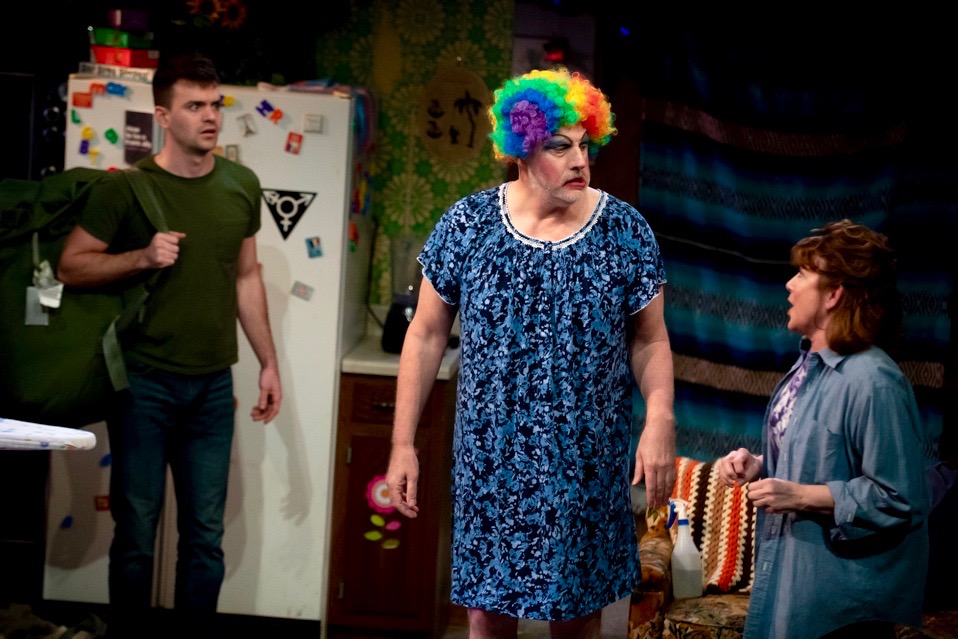American Apocalypse: Nuclear Family Goes Nuclear in ‘Hir’
- Like
- Digg
- Del
- Tumblr
- VKontakte
- Buffer
- Love This
- Odnoklassniki
- Meneame
- Blogger
- Amazon
- Yahoo Mail
- Gmail
- AOL
- Newsvine
- HackerNews
- Evernote
- MySpace
- Mail.ru
- Viadeo
- Line
- Comments
- Yummly
- SMS
- Viber
- Telegram
- Subscribe
- Skype
- Facebook Messenger
- Kakao
- LiveJournal
- Yammer
- Edgar
- Fintel
- Mix
- Instapaper
- Copy Link

When ex-Marine Isaac returns from combat to find Dad drugged, demented, and decked in drag, he learns that Mom has launched a revolution on the home front. The actors (L to R) are Tad Cooley, Douglas Rees, and Helena Ruoti.
What a mess! Here’s a young man just back from military service in the Middle East, where he worked in a Mortuary Affairs unit, gathering up pieces of fellow soldiers who’d been blown to bits. Now he walks into his Middle American home of origin and sees that it, too, is scrambled beyond recognition.
Piles of dirty laundry and assorted junk lie scattered everywhere. Furniture has been shoved out of place. Most shockingly, his middle-aged dad—a big, balding brute of a guy—is shambling around in a housedress and fright wig, with makeup on his face. And yet another shock awaits. The young man will soon discover that his teenaged sister is no longer a sister.
“What you think you know, you do not know,” Mom informs him. Then later, to help clarify her son’s re-entry to civilian life, she lets him in on a cosmic secret: “We are all transgender fish.”
Welcome to Taylor Mac’s Hir, on stage at barebones productions through May 26. The play is hilarious. It is disturbing. If pressed for a bottom line, I’d call it a cross between a Marx Brothers romp and a Greek tragedy.
But that doesn’t fully capture it, because Hir digs into themes that neither Groucho nor Harpo nor Sophocles explored with any depth—such as gender fluidity.
So yeah, on one level, it’s a trans play. But that doesn’t get it, either, because it’s also a play about a lot of opposites. Including, though not limited to: love versus violence, patriarchy versus matriarchy, liberation versus limitation, and the quest for individuality versus the need to belong.
Am I over-intellectualizing Hir? Yes. More than anything, it is a play that converts intellectual matter to emotional energy. And in that sense it’s like E=mc2. Maybe you don’t understand it, but you sure as heck will feel its effects. I recommend the experience. This play, chronicling the explosion of a nuclear family, is extremely good.
Down With Home Rule!
Revelations come popping like firecrackers throughout the course of Hir. It seems that while young buck Isaac (played by Tad Cooley) was off at war, his mother (Helena Ruoti) decided to stage a coup.
Never again would she settle for being an abused and unfulfilled housewife. Her big chance came when the domineering dad (Douglas Rees) suffered a stroke. Suddenly the abuser-in-chief wasn’t so scary, whereupon Mom took advantage. She now pumps Dad full of daily doses of an un-prescribed medication: the female hormone estrogen.
“You can’t give Dad estrogen!” Isaac objects. “It keeps him docile,” Mom replies—and besides, doesn’t he look stunning in his rainbow wig and eye shadow?
Meanwhile, Isaac’s kid sister Max (Liam Ezra Dickinson) is executing a different kind of coup. Max, as Mom puts it, “has become an innovator in gender.” Fueled by the opposite hormone—testosterone—Max is now on the way to being a trans man.
Apparently, however, Max isn’t 100 percent committed to that identity. Rather than asking to be referred to by the male pronouns “he” and “him,” Max insists on non-binary (that is, non-gender-specific) pronouns. The ones Max prefers are “ze” in place of “he” or “she,” and “hir” (pronounced “here”) in place of “him” or “her.”

There’s nothing like banjo music to bring a fractured family together—especially banjo music from a trans teen! Max (Liam Ezra Dickinson, L) gamely gives Mom’s latest scheme a try.
Mom, ever helpful, explains the situation to Isaac with the use of a whiteboard. “There are no longer two genders,” she says. Pointing to the letters she’s marked out, she enumerates an entire “alphabet of genders: L-G-B-T-T-S-Q-Q-I-A-A-P-Q-Z.”
It further seems that Mom and Max have formed a union of resistance to the oppressive Dad Rule that once prevailed in their household. Hence, the horrid state of clutter, with everything out of place: “We don’t do places any more,” Mom tells Isaac. “We don’t do cupboards. We don’t do order. Places and cupboards are what your father wants.”
Father, of course, is nearly helpless to respond. Stroke-impaired and drugged, the best he can do is flounder and squirm like a beached whale in lipstick while uttering guttural moans.
Why It Ain’t Merely Weird
Is Hir grotesque? Extremely so. And, in lesser hands, it could have turned into a lesser play than it is. It could’ve become a nasty, predictable parody of a whacked-out modern family, a play that wallows in its own weirdness, reaching for easy laughs and gasps of superficial shock.
Hir doesn’t follow that low road. Thanks to the skill of the playwright—and the performances of the barebones cast—the play develops into a genuine gut-wrencher, with surprising bursts of hysterical comedy and truly tragic turns.

Mom queries Isaac on the naughty deeds that got him booted from the Marines.
This is due partly to the narrative setup. Clearly, Dad Rule has been replaced by Mom Rule—Ruoti is a marvelous whirlwind as the ditzy, yet newly domineering, mother—and you have to wonder: How long is that regime going to last?
When Isaac attempts to restore some semblance of order to the home, complex and shifting battle lines are drawn. Like Mom and Max, he dreads his once-fearsome dad, but unlike them he wants to ease the shackles placed on the poor beast. Isaac also tries hard to reconcile himself to the now-trans Max, but has trouble figuring out exactly to whom or what he should be reconciled.
Which brings up another virtue of Hir. The characters may be “types”—one could in fact call them standard stock types—but they’re not stereotypes. Despite their flaws—did I mention that even Isaac, the earnest do-gooder, was discharged from the U.S. Marines for bad behavior?—despite their flaws, they’ve each got likable sides, or at least sympathetic sides.
You wind up rooting for all of them. And of course, they all can’t win. If there’s a hero in the play, it might be Max. Ze is the character dealing with the most profound uncertainty imaginable, uncertainty as to who ze really is. Yet ze often manages to be more level-headed and clear-sighted than anyone around.
Enough. I could go on quoting favorite lines and describing favorite scenes from Hir. Space does not permit me to tell you about the astounding hilarity of the shadow-puppet scene. Sensitivity to spoilers precludes giving away the play’s shocking end, which is capped by the most devastating last line I’ve heard in many a day.
Hir is hot. See it while you can.
Closing Credits and Ticket Info
Taylor Mac’s Hir premiered in San Francisco in 2014. The play is directed for barebones productions by Patrick Jordan, the company’s founding Artistic Director. He elicits great work from the cast—who, along with Helena Ruoti’s star turn, excel as follows:
Tad Cooley is dead-on as the earnestly striving Isaac. His flat, slightly nasal Mid-American accent (which may be his natural voice) conjures up echoes of young Jimmy Stewart: a fitting cultural resonance, as one can almost imagine Stewart bewailing the loss of the old American “order” that’s being toppled in Hir.
Douglas Rees, as the addled Dad, works wonders within the confines of his role. Though much of the time he just sits and drools, you can’t take your eyes off him. When he lumbers into action, every move is suspenseful, and when he utters something intelligible—like his scornful roar, “College!” when the subject is up for discussion—it’s a hoot.
And Liam Ezra Dickinson is simply perfect as Max. Watching Dickinson’s trans Max, you feel that you know this person … not in the sense of understanding hir completely, but in the sense that you’ve met someone like hir before. Which you undoubtedly have.
Through May 26 in the barebones black box, 1211 Braddock Ave., Braddock. For showtimes and tickets, visit barebones on the web.
Photos by Jeff Swensen.
Mike Vargo, a Pittsburgh-based freelance writer, covers theater for Entertainment Central.
Share on Social Media
- Like
- Digg
- Del
- Tumblr
- VKontakte
- Buffer
- Love This
- Odnoklassniki
- Meneame
- Blogger
- Amazon
- Yahoo Mail
- Gmail
- AOL
- Newsvine
- HackerNews
- Evernote
- MySpace
- Mail.ru
- Viadeo
- Line
- Comments
- Yummly
- SMS
- Viber
- Telegram
- Subscribe
- Skype
- Facebook Messenger
- Kakao
- LiveJournal
- Yammer
- Edgar
- Fintel
- Mix
- Instapaper
- Copy Link
Follow Entertainment Central
Sign up for the EC Newsletter
Latest Stories







